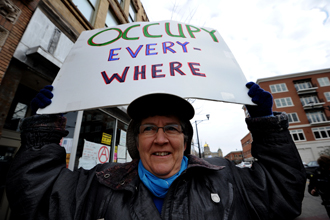Social networking impacts global movements
What do President Barack Obama's election, Tahrir Square and Occupy movement have in common? Each shares the dream of a utopian society, of course. Yale University sociologist Jeffrey C. Alexander discussed the powers of idealism, technology and civil society in his lecture on the Tulane uptown campus about “Making Meaning in Public: The Performative Politics of Obama, Egypt and Occupy.”

An activist with “Occupy Iowa Caucuses” displays a placard during a march in Des Moines, Iowa, prior to January's Republican caucus. (Photo by Jewel Samad/AFP/Getty Images)
A renowned author and social theorist, Alexander spoke at an event sponsored by the sociology department and several Tulane organizations on Thursday (Jan. 26).
He incorporated a brief history of social change and civil action to describe the ways in which the three latest “global civil society social movements” the election of President Obama, the Tahrir Square protests in Cairo and the Occupy movement have made their mark through the use of social networking, which has helped spread their message of utopian democracy at a major international level.
“The restless arc of civil utopia has not yet crested,” Alexander explained to the group gathered in Rogers Memorial Chapel.
According to Alexander, Tahrir Square represented “a microcosm of civil utopia,” and the grand performance element of Occupy Wall Street as a “virtual” protest had similar impact.
Conversely, Alexander determined that after winning the presidency, Obama's “utopian aspirations” were destroyed by “Republican partisanship.” Regardless, Alexander connected each of these events and their impact around the world, adopting the new term “The Age of Occupy Wall Street” as a way to explain the current state of global affairs.
“I would argue that we are at least temporarily in this new age,” he said.
Incorporating the theme of technology and social networking as a means of social change, Tulane sociology faculty members David G. Ortiz, Stephen F. Ostertag and Diane M. Grams followed Alexander's presentation by explaining their own research on the blogosphere and public parades in relation to post-Katrina New Orleans.
Michaela Gibboni is a senior at Tulane, majoring in communication and Spanish.
